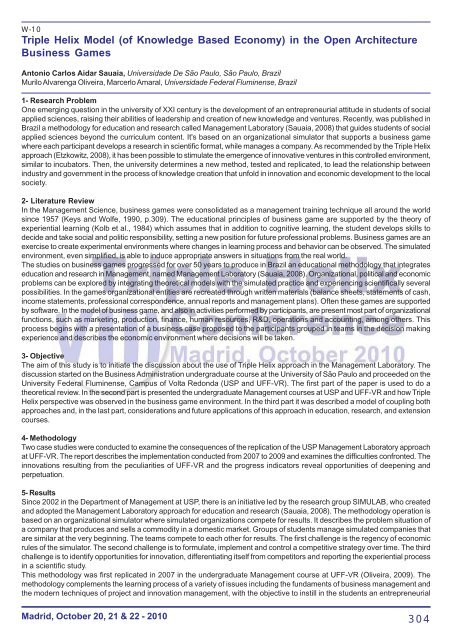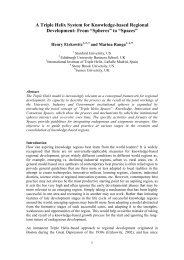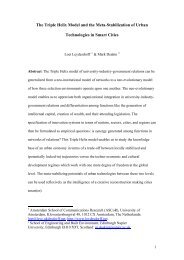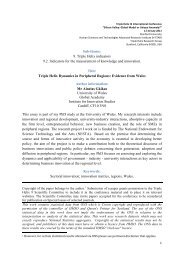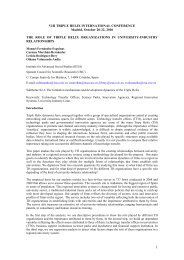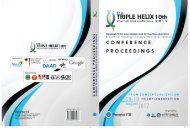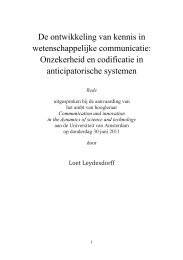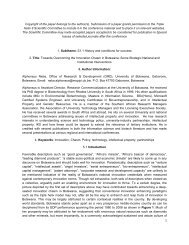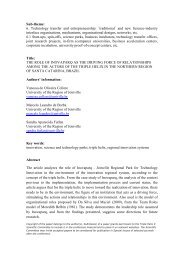TRIPLE HELIX noms.pmd
TRIPLE HELIX noms.pmd
TRIPLE HELIX noms.pmd
Create successful ePaper yourself
Turn your PDF publications into a flip-book with our unique Google optimized e-Paper software.
W-10Triple Helix Model (of Knowledge Based Economy) in the Open ArchitectureBusiness GamesAntonio Carlos Aidar Sauaia, Universidade De São Paulo, São Paulo, BrazilMurilo Alvarenga Oliveira, Marcerlo Amaral, Universidade Federal Fluminense, Brazil1- Research ProblemOne emerging question in the university of XXI century is the development of an entrepreneurial attitude in students of socialapplied sciences, raising their abilities of leadership and creation of new knowledge and ventures. Recently, was published inBrazil a methodology for education and research called Management Laboratory (Sauaia, 2008) that guides students of socialapplied sciences beyond the curriculum content. It's based on an organizational simulator that supports a business gamewhere each participant develops a research in scientific format, while manages a company. As recommended by the Triple Helixapproach (Etzkowitz, 2008), it has been possible to stimulate the emergence of innovative ventures in this controlled environment,similar to incubators. Then, the university determines a new method, tested and replicated, to lead the relationship betweenindustry and government in the process of knowledge creation that unfold in innovation and economic development to the localsociety.2- Literature ReviewIn the Management Science, business games were consolidated as a management training technique all around the worldsince 1957 (Keys and Wolfe, 1990, p.309). The educational principles of business game are supported by the theory ofexperiential learning (Kolb et al., 1984) which assumes that in addition to cognitive learning, the student develops skills todecide and take social and politic responsibility, setting a new position for future professional problems. Business games are anexercise to create experimental environments where changes in learning process and behavior can be observed. The simulatedenvironment, even simplified, is able to induce appropriate answers in situations from the real world.The studies on business games progressed for over 50 years to produce in Brazil an educational methodology that integrateseducation and research in Management, named Management Laboratory (Sauaia, 2008). Organizational, political and economicproblems can be explored by integrating theoretical models with the simulated practice and experiencing scientifically severalpossibilities. In the games organizational entities are recreated through written materials (balance sheets, statements of cash,income statements, professional correspondence, annual reports and management plans). Often these games are supportedby software. In the model of business game, and also in activities performed by participants, are present most part of organizationalfunctions, such as marketing, production, finance, human resources, R&D, operations and accounting, among others. Thisprocess begins with a presentation of a business case proposed to the participants grouped in teams in the decision makingexperience and describes the economic environment where decisions will be taken.3- ObjectiveThe aim of this study is to initiate the discussion about the use of Triple Helix approach in the Management Laboratory. Thediscussion started on the Business Administration undergraduate course at the University of São Paulo and proceeded on theUniversity Federal Fluminense, Campus of Volta Redonda (USP and UFF-VR). The first part of the paper is used to do atheoretical review. In the second part is presented the undergraduate Management courses at USP and UFF-VR and how TripleHelix perspective was observed in the business game environment. In the third part it was described a model of coupling bothapproaches and, in the last part, considerations and future applications of this approach in education, research, and extensioncourses.4- MethodologyTwo case studies were conducted to examine the consequences of the replication of the USP Management Laboratory approachat UFF-VR. The report describes the implementation conducted from 2007 to 2009 and examines the difficulties confronted. Theinnovations resulting from the peculiarities of UFF-VR and the progress indicators reveal opportunities of deepening andperpetuation.5- ResultsSince 2002 in the Department of Management at USP, there is an initiative led by the research group SIMULAB, who createdand adopted the Management Laboratory approach for education and research (Sauaia, 2008). The methodology operation isbased on an organizational simulator where simulated organizations compete for results. It describes the problem situation ofa company that produces and sells a commodity in a domestic market. Groups of students manage simulated companies thatare similar at the very beginning. The teams compete to each other for results. The first challenge is the regency of economicrules of the simulator. The second challenge is to formulate, implement and control a competitive strategy over time. The thirdchallenge is to identify opportunities for innovation, differentiating itself from competitors and reporting the experiential processin a scientific study.This methodology was first replicated in 2007 in the undergraduate Management course at UFF-VR (Oliveira, 2009). Themethodology complements the learning process of a variety of issues including the fundaments of business management andthe modern techniques of project and innovation management, with the objective to instill in the students an entrepreneurialMadrid, October 20, 21 & 22 - 2010304


